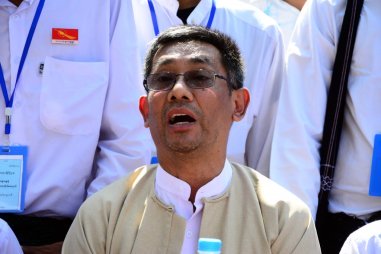Following the collapse on Tuesday of Naypyidaw talks between student and government representatives discussing the National Education Law, DVB spoke to Dr Thein Lwin, a representative of National Network for Education Reforms (NNER) who has been in attendance at the previous negotiations.
Q: We have learned that the talks about the National Education Law being held in Naypyidaw have been postponed. Can you tell us why, and for how long they have been delayed?
On Tuesday we were not allowed to enter the Education Ministry building. We arrived in the morning but were refused access. Government officials told our students, NNER representatives and others assisting us to get out of their vehicles. They told us that we weren’t allowed through the gate. We insisted that it was necessary for those assisting us to be allowed in, along with members of the media, but they refused.
After talks went back an forth for a while, our representatives were informed that the talks had been postponed and would only be resumed after Union Day on 12 February. No solid reason was provided. The postponement was a one-sided decision from the government.
[pullquote]”We were looking forward to negotiating, but the government unilaterally suspended the talks.”[/pullquote]
Q: We have also heard that the NNER representatives were forced to sleep in their car on Monday night.
Representatives of the NNER and the Committee for Democracy Education Movement (CDEM) arrived in Naypyidaw on Monday night. We had difficulties finding accommodation at the municipal guesthouse. Previously, the officials had pledged to arrange accommodation for us there, but upon arrival we were denied entry by the staff. They said that “the minister” had instructed them not to allow us to stay there.
A senior teacher from Mandalay, also an NNER representative who arrived before us, was also denied stay. That individual was also questioned and threatened. Moreover, another NNER representative called Thein Lwin, who owns a school for the blind in Rangoon, was visited and searched by authorities [on Monday night]. We see this as harassment.
We arrived late in Naypyidaw on Monday and found ourselves without anywhere to stay. The students had to sleep on the bus. The next morning, we arrived to attend the meeting at 9am and were denied entry, and then told that the talks had been cancelled. We were looking forward to negotiating, but the government unilaterally suspended the talks.
Q: There are claims that the talks could not take place because the students brought along a further 15 representatives than had previously been agreed.
The government representatives also brought helpers to the meeting, such as typists and note takers. But our assistants were refused. The government also brought along representatives from the Myanmar Peace Centre who are not listed among participants in the four-way talks. Right now, they are inside the Ministry of Education and they also presented in the previous meeting at the Diamond Jubilee Hall [in Rangoon University]. At the last meeting, members of the media and other observers were also permitted. We question why we were specifically restricted from doing the same.
Q: You said that the government one-sidedly postponed the talks. Was there no negotiation on this?
No. It was not negotiated. Minister Aung Min just called three representatives each from the NNER and the group of students into the meeting room and told them that the talks had been postponed.
Q: The talks were postponed until after 12 February. Is there a specific date, or is the postponement indefinite?
[related]
We can say that the talks were postponed indefinitely.
Q: You said that the guesthouse staff claimed they were instructed by “the minister” to deny the students accommodation. Who is this minister? Have you filed any compliant?
Not yet. The staff at the municipal guesthouse only told us that they had been told not to allow us there. We don’t know which minister they were referring to.
Q: Initially, there were positive sentiments about the talks. Why do you think it has come to an abrupt stop in this way?
This was unexpected. We were looking forward to talking, to negotiating and finding answers. We previously thought that the meeting at the Diamond Jubilee Hall would just be superficial, to appease us without any real discussion. But most of the nine preconditions suggested by the students were agreed upon, and the officials also pledged to continue negotiating the only outstanding point. This would have made way to allow for discussion of the students’ 11 core demands. Now that they have cancelled the meeting, we feel that they are going back on their words.
Q: The Ministry of Information has reported on its website that the meeting did not take place because the students did not show up. Is there anything you would like to say about this?
That it is not true. We were waiting outside the meeting but we were not allowed access.
Q: Are there any further comments that you would like to make?
We want this four-way dialogue to take place. We are seeking answers through negotiations, which I see as the best way to deal with these issues surrounding the education reforms that students long for.
Interview by Aye Nai



